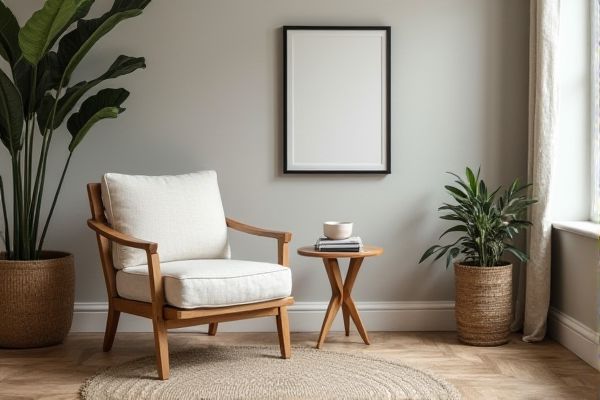
Upholstered chairs offer superior comfort and cushioning, making them ideal for prolonged seating, while wood chairs provide durability and a classic, sturdy aesthetic that fits various decor styles. Explore the rest of the article to discover which chair best suits Your needs and preferences.
Table of Comparison
| Feature | Upholstered Chair | Wood Chair |
|---|---|---|
| Comfort | High, with cushioned padding and fabric cover | Moderate, firm seat with no padding |
| Durability | Moderate, fabric prone to wear and stains | High, solid wood resists damage |
| Maintenance | Requires regular cleaning and occasional fabric care | Easy to clean, low maintenance |
| Weight | Generally heavier due to padding | Lighter, easy to move |
| Style | Elegant, variety of fabric options | Classic, natural wood finish |
| Cost | Usually higher price due to materials | Typically more affordable |
| Best Use | Living rooms, offices, and formal settings | Dining rooms, patios, casual spaces |
Introduction: Upholstered Chair vs Wood Chair
Upholstered chairs offer enhanced comfort through padded cushions and fabric or leather coverings, making them ideal for prolonged seating. Wood chairs provide durability and a timeless aesthetic, often featuring intricate craftsmanship and natural finishes that complement various interior styles. Your choice depends on the balance between comfort needs and design preferences for functionality and ambiance.
Material Composition and Design
Upholstered chairs feature a combination of wood or metal frames cushioned with foam, fabric, or leather coverings, offering enhanced comfort and aesthetic versatility. Wood chairs exhibit solid hardwood or engineered wood construction, providing durability and a classic, natural appearance that complements various interior styles. The material composition of upholstered chairs allows for ergonomic shaping and softness, while wood chairs emphasize structural integrity and minimalist design.
Comfort and Ergonomics Comparison
Upholstered chairs provide superior comfort and ergonomics due to their padded cushions and supportive fabric that conform to your body's contours, reducing pressure points during extended sitting. Wood chairs offer firm support but may lack the ergonomic benefits of cushioning, often requiring additional seat pads or ergonomic accessories for prolonged use. Choosing an upholstered chair enhances your seating experience by promoting better posture and minimizing discomfort.
Aesthetics and Visual Appeal
Upholstered chairs offer a softer, more luxurious visual appeal with a variety of fabric patterns and colors that can enhance the warmth and coziness of any space. Wood chairs showcase natural grain textures and finishes, providing a timeless, classic look that complements both rustic and modern interiors. Choosing between the two depends on desired style preferences, with upholstered chairs emphasizing comfort and vibrancy, while wood chairs highlight structural elegance and natural beauty.
Durability and Lifespan
Upholstered chairs offer comfort but generally have a shorter lifespan due to fabric wear and potential padding compression, requiring more frequent maintenance or replacement. Wood chairs are renowned for their durability, often lasting decades or even generations with proper care, and resist damage better from everyday use. High-quality hardwoods like oak or teak significantly enhance the structural integrity and longevity of wood chairs compared to softer materials.
Maintenance and Cleaning Requirements
Upholstered chairs require regular vacuuming and occasional professional cleaning to maintain fabric integrity and prevent stains, while wood chairs typically need dusting and periodic polishing to preserve their finish and prevent drying or cracking. Spills on upholstered chairs demand prompt attention to avoid deep stains, whereas wood chairs can be wiped clean easily with a damp cloth. Choosing between the two depends on your preference for maintenance ease and the expected level of use in your space.
Versatility in Interior Decor
Upholstered chairs offer versatility in interior decor through their wide range of fabrics, colors, and textures, easily complementing various design styles from modern to classic. Wood chairs provide timeless appeal and structural simplicity, blending seamlessly with rustic, traditional, or minimalist spaces. Your choice depends on whether you prioritize comfort and softness or durability and natural aesthetics in your decor.
Cost and Value Analysis
Upholstered chairs typically have a higher upfront cost compared to wood chairs due to materials like fabric, padding, and complex construction. Wood chairs offer greater durability and lower maintenance expenses, providing long-term value, especially in high-traffic areas. Your choice should balance initial investment against lifespan and comfort preferences to maximize overall cost-effectiveness.
Eco-Friendliness and Sustainability
Upholstered chairs often use synthetic fabrics and foam that may contain non-biodegradable materials, leading to longer decomposition times and potential environmental harm. Wood chairs crafted from sustainably sourced timber offer a renewable, biodegradable option with a lower carbon footprint, especially when FSC-certified wood is used. Choosing your chair based on eco-friendliness involves prioritizing natural materials and certifications that ensure responsible forest management and reduced environmental impact.
Which Chair Type Suits Your Needs?
Upholstered chairs offer superior comfort and cushioning, ideal for prolonged seating in living rooms or offices, while wood chairs provide durability and a classic aesthetic suitable for dining areas or outdoor use. Consider the chair's primary function, maintenance requirements, and interior design style to determine which type aligns best with your lifestyle. Ergonomics and personal preference in texture also play crucial roles in selecting between upholstered and wood chairs.
 homyna.com
homyna.com